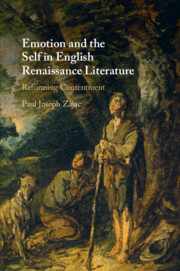Book contents
- Emotion and the Self in English Renaissance Literature
- Emotion and the Self in English Renaissance Literature
- Copyright page
- Dedication
- Contents
- Acknowledgments
- Introduction
- Chapter 1 Constructing Contentment in Reformation England
- Chapter 2 Romancing Contentment
- Chapter 3 Fashioning Contentment
- Chapter 4 Performing Contentment
- Chapter 5 Losing Contentment
- Conclusion
- Notes
- Bibliography
- Secondary Sources
- Index
Chapter 4 - Performing Contentment
Communal Affect and Passionate Disconnect in Shakespeare’s As You Like It and Othello
Published online by Cambridge University Press: 15 December 2022
- Emotion and the Self in English Renaissance Literature
- Emotion and the Self in English Renaissance Literature
- Copyright page
- Dedication
- Contents
- Acknowledgments
- Introduction
- Chapter 1 Constructing Contentment in Reformation England
- Chapter 2 Romancing Contentment
- Chapter 3 Fashioning Contentment
- Chapter 4 Performing Contentment
- Chapter 5 Losing Contentment
- Conclusion
- Notes
- Bibliography
- Secondary Sources
- Index
Summary
Chapter 4 examines the relationship between individual, communal, and political contentment in Shakespeare’s plays. Shakespeare presents contentment as most successful when shared between selves, whereas an overly possessive attitude toward one’s contentment jeopardizes its existence. As You Like It depicts a commonwealth built upon the bonds between subjects and preserved through mutual contentment. By contrast, the malcontent Iago identifies vulnerabilities in Othello’s understanding of contentedness to destroy his relationships with Desdemona and Venetian society writ large. In As You Like It, communal contentment counteracts the social threat of envy, but in Othello jealousy distorts content beyond the point of recognition or redemption. Shakespeare does not shy away from the challenges to contentment, but he attempts to provide audiences with collective experiences of positive emotion and to unite them in the face of tragedy. Though recent critics have described the Renaissance theatre as an arena for emotional extremes, this chapter broadens our perspective of Shakespearean emotion to include a contentment that shares the stage with other affects.
- Type
- Chapter
- Information
- Emotion and the Self in English Renaissance LiteratureReforming Contentment, pp. 101 - 124Publisher: Cambridge University PressPrint publication year: 2022

